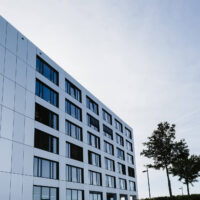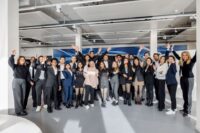Experience is and will remain the best training
There is no question about it: Well-founded and complex knowledge forms the basis for being able to successfully operate and make good decisions in day-to-day management. However, such theoretical equipment alone is not enough – experience and the personal courage to drive projects are just as important. As part of the "Capstone Project", our students learn about the challenges involved, how teams function successfully and how to concentrate on what is essential without getting bogged down in details. The module is dedicated to real tasks from real companies and forms the heart of the three-semester Full-Time MBA in Digitalization & Industrial Change.
Independent yet well-accompanied
Taking on a leadership role in a company entails a high level of responsibility. Mistakes can have serious consequences. The Capstone Project therefore gives students the opportunity to make brave management decisions with a safety net and thus to gain their own practical experience during the course. The students are closely accompanied by Dr. Garnet Kasperk, director of the Center for International Automobile Management at RWTH Aachen and co-director of the full-time MBA: "Everything the students have gained in management methods, number-based analysis possibilities and knowledge on change processes during the two semesters prior to the Capstone module comes together here. The module runs over a full semester, and two days per week are dedicated to it."
Real tasks from companies
Thanks to Kasperk’s close contact with companies (not only) from the automotive sector, the prospective MBA graduates can work on real, complex tasks. "The topics covered can come from different areas of the entire value-added chain. The teams of five to six students each proceed in the same analytical way that corporate managers or external consultants would work," Kasperk explains. The current cohort is working on the project together with e.Volution, a supplier of electric vehicles and holistic mobility solutions founded in the vicinity of RWTH Aachen. The company plans to build circular economy vehicles, creating completely closed recovered substance cycles and recycling processes. The students have intensively handled recycling strategies and their implementation for the start-up company – a mammoth task with many deep insights into all process areas as well as with analyses of market potential and future customer requirements.
A close exchange between theory and practice
"We rely on companies being open and prepared to provide comprehensive data for our analyses. And of course it can happen that we arrive at different results to what the company expected," reports Kasperk. Company representatives and students therefore come together regularly, at least once every three weeks, to discuss the project status, outstanding issues and the next steps – much more than just working on a case on paper. It is precisely this high practical degree of the module and the direct relationship with the real company that make all the difference. And these factors are likely a decisive reason for the students’ high level of motivation. The teams largely organise themselves and usually invest much more time than the two scheduled days per week – many topics are pursued further during the evenings and at weekends.
Capacity for teamwork and communication
It is naturally a great sense of achievement for our students when they see that their suggestions are actually applied and implemented in companies, says Kasperk. However, the learning effect in terms of team organisation, time management and communication among each other is just as significant. "The challenging tasks spark very intensive processes in the groups. It is all about how the individual people integrate, argue their case and jointly reach solutions – situations in which the students will also find themselves later in their jobs. They can also learn a lot from potential points of friction or conflict within the group."
Decisions take courage
Another important learning effect is that, at a certain point, a decision has to be made instead of analysing further and further. "Naturally, we act on the basis of sound analyses and comprehensive data and figures. But in the end you also need decision-making abilities – eventually you need to take a decision and then personally stand by it," emphasises Dr Garnet Kasperk. The teams are then well prepared when they come to work on their final results presentations within the Capstone Project – the highlight of the MBA, which is to enable students particularly to carry out management tasks in digitalisation and transformation.
Actively helping to shape transformation
The Full-Time MBA in Digitalization & Industrial Change is aimed at interested persons with a degree in the STEM area (science, technology, engineering and mathematics) or a business management or economic background and at least two years’ work experience. The course takes place in English and spans three semesters.


